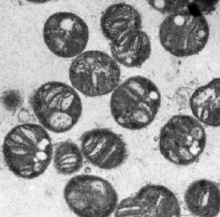Methylococcus capsulatus
This article needs additional citations for verification. (December 2009) |
| Methylococcus capsulatus | |
|---|---|

| |
| Scientific classification | |
| Kingdom: | |
| Phylum: | |
| Class: | |
| Order: | |
| Family: | |
| Genus: | |
| Species: | M. capsulatus
|
| Binomial name | |
| Methylococcus capsulatus Foster and Davis 1966 (Approved Lists 1980)
| |
Methylococcus capsulatus is an obligately methanotrophic gram-negative, non-motile coccoid bacterium. M. capsulatus cells are encapsulated and tend to have a diplococcoid arrangement. In addition to methane, M. capsulatus is able to oxidize some organic hydrogen containing compounds such as methanol. M. capsulatus has also been demonstrated to be thermotolerant- that is, it can grow well up to 50°C, though its optimum growth temperature is 37°C. In addition, M. capsulatus can live in conditions in which there is little molecular oxygen available.
Methylococcus capsulatus is a Type I methanotroph, meaning that it is a member of the Gammaproteobacteria and that it utilizes the ribulose monophosphate pathway (RuMP) for formaldehyde assimilation. Methane is first oxidized to methanol, which then gets converted into formaldehyde. Formaldehyde can then be 1) further oxidized to formate and carbon dioxide for energy production or 2) assimilated into biomass.
The genome sequence of M. capsulatus (Bath) is available.[1]
Various strains of M. capsulatus have been isolated and studied, particularly M. capsulatus (Bath), M. capsulatus (Texas) and M. capsulatus (Aberdeen).
References
- ^ Ward, Naomi; Larsen, ØIvind; Sakwa, James; Bruseth, Live; Khouri, Hoda; Durkin, A. Scott; Dimitrov, George; Jiang, Lingxia; et al. (2004). "Genomic Insights into Methanotrophy: the Complete Genome Sequence of Methylococcus capsulatus (Bath)". PLoS Biology. 2 (10): e303. doi:10.1371/journal.pbio.0020303. PMC 517821. PMID 15383840.
{{cite journal}}: CS1 maint: unflagged free DOI (link)
